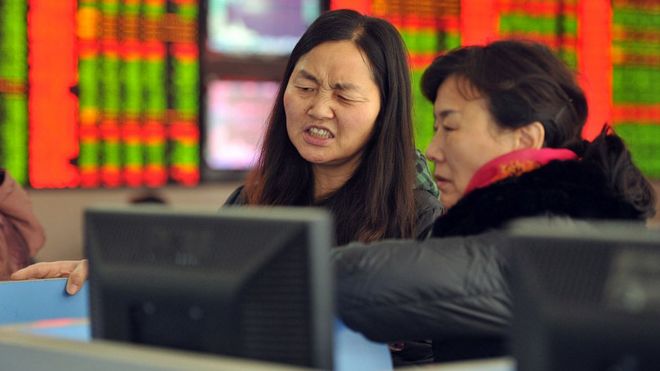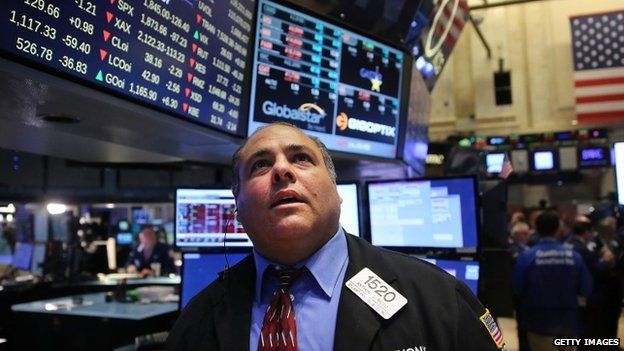 Image copyrightAFP
Image copyrightAFPA slump in Chinese shares has prompted stock markets across Asia, Europe and the US to fall sharply. Why is this so significant?
What's behind the fall in China?
The wider story is that China's economic growth is slowing and there are concerns that the transition to a slower and more sustainable rate of growth might be disruptive.
That was true of the period of several weeks of volatility the market experienced after it peaked in June last year.
It's true this time too and the link is perhaps rather more direct now.
Why? Because the immediate sparks for the latest bout of instability were warning signs about the wider economy.
The first day when trading was suspended, figures showing a continued decline in manufacturing were one of the factors that set things rolling downhill. On the second day of suspension it was the sliding currency which raised concerns about whether it was a sign that the economy was slowing down more sharply than thought.
 Image copyrightGetty Images
Image copyrightGetty Images
What does this mean for the rest of the world?
The direct financial impact of lower share prices in China is moderate. There is not enough foreign investment in the Chinese market for it to be a major problem. The London consultancy Capital Economics has said foreigners own just 2% of shares
The issue is more about whether the financial turbulence shines a light on wider issues about the economic slowdown in China: is the economy heading for what's called a "hard landing", too sharp a slowdown?
China is now such a big force in the global economy that it would inevitably affect the rest of the world. It is the second largest economy and the second largest importer of both goods and commercial services.
The direct financial impact of lower share prices in China is moderate. There is not enough foreign investment in the Chinese market for it to be a major problem. The London consultancy Capital Economics has said foreigners own just 2% of shares
The issue is more about whether the financial turbulence shines a light on wider issues about the economic slowdown in China: is the economy heading for what's called a "hard landing", too sharp a slowdown?
China is now such a big force in the global economy that it would inevitably affect the rest of the world. It is the second largest economy and the second largest importer of both goods and commercial services.
 Image copyrightAFP
Image copyrightAFP
It's not just stocks.
The prices of many commodities have been affected, notably crude oil. It's not just about China, for sure. Abundant supplies have been every bit as important in the oil market in the last eighteen months. But China's problems have been a significant factor adding further downward pressure to the price of crude oil. The price of Brent crude has fallen by about half since mid-June, when the first stage of the Chinese stock market slide began.
China is such a large buyer of industrial commodities that the possibility of lower-than-expected sales to the country has also undermined the prices of copper and aluminium, for example.
Gold has gained ground a little this week. It is seen by many as a safe investment, protection against both inflation and more general financial instability.
There is certainly a possibility of that kind of "safe haven" effect in other markets if the Chinese stock price falls make investors more wary about risks. In the currency markets, the most likely candidates are the yen and the Swiss franc. The dollar could also be affected, though the US currency already has a strong tailwind from the Federal Reserve's interest rate policy. The Fed started to raise rates last month and that has been encouraging investors to buy dollars. But it's a bit early to draw any firm conclusions.
Some of the currencies that investors might sell if they become more risk averse have shown some impact. Turkey, Brazil and South Africa all have problems of their own and their currencies have weakened in the last few days.
There is also some sign this week of investors putting money into safe government bonds or debts, those seen as having negligible risks of default, such as the US, Germany, the UK and Switzerland.
The prices of many commodities have been affected, notably crude oil. It's not just about China, for sure. Abundant supplies have been every bit as important in the oil market in the last eighteen months. But China's problems have been a significant factor adding further downward pressure to the price of crude oil. The price of Brent crude has fallen by about half since mid-June, when the first stage of the Chinese stock market slide began.
China is such a large buyer of industrial commodities that the possibility of lower-than-expected sales to the country has also undermined the prices of copper and aluminium, for example.
Gold has gained ground a little this week. It is seen by many as a safe investment, protection against both inflation and more general financial instability.
There is certainly a possibility of that kind of "safe haven" effect in other markets if the Chinese stock price falls make investors more wary about risks. In the currency markets, the most likely candidates are the yen and the Swiss franc. The dollar could also be affected, though the US currency already has a strong tailwind from the Federal Reserve's interest rate policy. The Fed started to raise rates last month and that has been encouraging investors to buy dollars. But it's a bit early to draw any firm conclusions.
Some of the currencies that investors might sell if they become more risk averse have shown some impact. Turkey, Brazil and South Africa all have problems of their own and their currencies have weakened in the last few days.
There is also some sign this week of investors putting money into safe government bonds or debts, those seen as having negligible risks of default, such as the US, Germany, the UK and Switzerland.
 Image copyrightReuters
Image copyrightReutersWhat about ordinary Chinese people?
Those who have borrowed money to buy shares in the last year have already been hit very hard. But most people don't own shares - only one person in 30 does, according to Capital Economics.
For most Chinese the wider issue is about the health of the country's economy. If China manages a smooth transition to a slower and more sustainable growth rate, it is likely to still be fast enough to generate rising living standards for most people. A more disruptive slowdown would mean many business failures and job losses.
What might the Chinese authorities do next?
They have several options to stimulate the economy which can affect the stock markets. They could cut interest rates, they could relax the rules on bank lending or they could increase spending. They could also encourage the currency, the yuan, to fall further to stimulate exports. There are problems with these options. Anything that encourages more lending could mean more distressed borrowers in the future. A falling currency has already fed into the stock market drama.
In addition the authorities have taken steps more specifically targeted on the stock market. They have extended restrictions on large investors selling shares. State investment funds have been buying shares. These measures can have an impact but they are unlikely to provide a definitive solution.
How worried should we be?
Views vary about how healthy the Chinese economy is. Capital Economics have been consistently relatively upbeat about China and they said in a note to clients this week:
"We continue to believe that growth is more likely to pick up than weaken over coming months."
But the investor George Soros is more gloomy, telling an economic forum in Sri Lanka:
"China has a major adjustment problem. I would say it amounts to a crisis. When I look at the financial markets there is a serious challenge which reminds me of the crisis we had in 2008."
A crisis there would be serious for the rest of the world, particularly countries and firms that export to China.